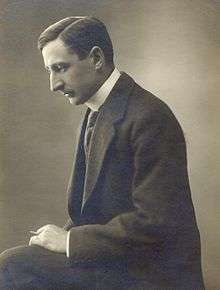Kuno von Klebelsberg
| Kuno von Klebelsberg | |
|---|---|
 Klebelsberg in 1900s | |
| Minister of the Interior of Hungary | |
|
In office December 1921 – 1922 | |
| Preceded by | Gedeon Ráday |
| Succeeded by | Iván Rakovszky |
| Minister of Religion and Education | |
|
In office 1922–1931 | |
| Preceded by | József Vass |
| Succeeded by | Sándor Ernszt |
| Personal details | |
| Born |
13 November 1875 Pecica, Hungary |
| Died | 12 October 1932 |
Count Kuno von Klebelsberg (13 November 1875, Pécska – 12 October 1932) was a Hungarian politician, who served as Minister of the Interior and Minister of Culture of the Kingdom of Hungary between the two world wars.
Klebelsberg was born in Magyarpécska, Austria-Hungary (today Pecica, Arad County, Romania). After World War I, the Treaty of Trianon and the ravages of the civil war, Klebelsberg assumed the position of Minister of the Interior in 1921, a post which he filled until the following year. Afterwards, he served as Minister of Culture (1922–1931) and introduced many educational reforms throughout Hungary. Klebelsberg helped create elementary schools in the countryside, began the modernisation of numerous universities, and created the foreign Hungarian cultural institute Collegium Hungaricum to create awareness of Hungarian culture in other countries.
Klebelsberg is also famous for introducing a progressive policy on scholarships for university students.
Klebelsberg, however, was controversial with his ideology of Hungarian supremacy, which attributed superior value to Hungarian ethnic culture over the minority ethnic cultures of the former Austro-Hungarian Monarchy (Serb, Slovak, Romanian, Jewish etc.). After the Trianon Treaty, Klebelsberg's ideology and educational reforms directly served the territorial revisionist and chauvinistic claims of the Hungarian regimes during the governor Miklos Horthy's reign. Klebelsberg was antisemitic blaming the entire Hungarian Jewry for the bourgeois liberal and communist revolutions and governments of 1918 and 1919, respectively,for the loss of territories associated with Trianon Treaty. In a dramatic outburst in 1924, he asked the Jews to give back Greater Hungary promising in exchange to lift the numerus clausus, the first introduced in 20th century Europe in the early 1920s.[1]
References
- ↑ (Source: Kovács M. Mária. 2012. Törvénytől sújtva. A numerus clausus Magyarországon, 1920-1945. Budapest: Napvilág)
| Political offices | ||
|---|---|---|
| Preceded by Gedeon Ráday |
Minister of the Interior 1921–1922 |
Succeeded by Iván Rakovszky |
| Preceded by József Vass |
Minister of Religion and Education 1922–1931 |
Succeeded by Sándor Ernszt |
| Wikimedia Commons has media related to Kuno von Klebelsberg. |